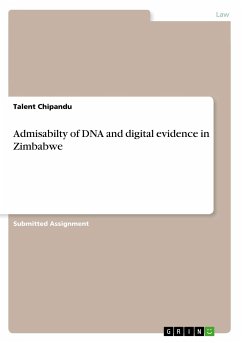Submitted Assignment from the year 2017 in the subject Law - Miscellaneous, grade: 80%, Midlands State University, course: Bachelor of Laws Honors Degree, language: English, abstract: The law of evidence in Zimbabwe is concerned with how information is presented and circumstances under which it can be excluded in a court of law. It is concerned with the relevance and admissibility of evidence in court. The law of evidence is used in both criminal and civil matters. It is common to human nature that when times change, there are new crimes that are committed and new areas of dispute which arise. The law must move with the changing times and address the new legal issues that come up. The introduction and adoption of digital and DNA evidence is an answer to modern day challenges and the need to ensure that justice is served. In Zimbabwe, the laws which provide for the admission of digital and DNA evidence are skeletal in nature except in criminal matter in relation to DNA. Due to other factors like poor technological advancements it is left to the court to determine the admissibility and relevance of evidence in the form of digital and DNA evidence. The legislature and courts are gradually moving towards an era where digital and DNA evidence become independent forms of evidence. In as much as progress has been made and there are advantages to these forms of evidence, there are also disadvantages. It is the purpose of this write up to explore the advantages and disadvantages that have been brought about by the introduction of digital and DNA evidence in Zimbabwe.
Hinweis: Dieser Artikel kann nur an eine deutsche Lieferadresse ausgeliefert werden.
Hinweis: Dieser Artikel kann nur an eine deutsche Lieferadresse ausgeliefert werden.








